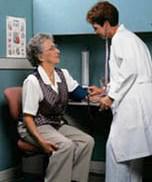

These findings were noted in the Feb. 8 issue of the Journal of the American Medical Association.
While the reason for the findings isn’t clear from the trial, “Under-treatment, in particular under-treatment of women with either chemotherapy or radiotherapy, may explain age-specific outcome in this relatively healthy population,” the research group suggested.
The 9,766 women enrolled in the randomized TEAM (Tamoxifen Exemestane Adjuvant Multinational) trial all got surgery and endocrine therapy.
A prior analysis of this trial, which had no upper age limit, pointed to more frequent drug discontinuation and less subsequent therapy, including radiation, among the women patients 75 or older.
Only 5% of the women 75 and older got adjuvant chemotherapy, yet, 48% of them had nodal involvement.
Analysis by age included 1,357 women 75 or older and 3,060 women ages 65 to 74, although the largest proportion of the women enrolled were under 65.
During a median of about five years of follow-up during the trial, the incidence of death from breast cancer was higher in the older age groups:
- 8.3% in patients ages 75 or older
- 6.3% in patients ages 65 to 74
- 5.7% in patients younger than 65 years
But all-cause mortality also was higher in the older groups due to competing causes of death, such that the proportion of deaths due to breast cancer declined with age, from 78% before age 65 to 36% at 75 and beyond.
Tumor size was larger at older age. Risk of breast cancer relapse also tended to be higher at older ages in multivariable analysis, with a hazard ratio of 1.07 at ages 65 to 74 and 1.29 at ages 75 and older, compared with those younger than 65
That finding suggested that selective misclassification, with death more often attributed to breast cancer at older ages, wasn’t likely a source of bias.
The research group cautioned that the results might not generalize to all breast cancer patients because the trial included only estrogen and progesterone receptor-positive breast cancer in postmenopausal women.
“These data underline the need for age-specific breast cancer studies in women in order to improve breast cancer outcome in patients of all ages,” the researchers concluded.
Sources:
- Journal of the American Medical Association


